Most Popular
-
1
IMF lowers Korea's 2025 growth outlook to 2%

-
2
Labor Ministry dismisses Hanni harassment case

-
3
North Korean troops fighting alongside Russia, NIS confirms

-
4
Reality show 'I Live Alone' disciplined for 'glorifying' alcohol consumption

-
5
[More than APT] Why apartment complexes flourish in Korea
![[More than APT] Why apartment complexes flourish in Korea](//res.heraldm.com/phpwas/restmb_idxmake.php?idx=644&simg=/content/image/2024/11/19/20241119050087_0.jpg&u=20241120105106)
-
6
[Herald Interview] How Gopizza got big in India
![[Herald Interview] How Gopizza got big in India](//res.heraldm.com/phpwas/restmb_idxmake.php?idx=644&simg=/content/image/2024/11/20/20241120050057_0.jpg&u=20241120164556)
-
7
Yoon focuses on expanding global solidarity against NK-Russia military ties at APEC, G20 summits

-
8
[KH Explains] Dissecting Hyundai Motor's lobbying in US
![[KH Explains] Dissecting Hyundai Motor's lobbying in US](//res.heraldm.com/phpwas/restmb_idxmake.php?idx=644&simg=/content/image/2024/11/20/20241120050034_0.jpg&u=)
-
9
Japan to hold 1st memorial for Korean forced labor victims at Sado mine

-
10
[Kim Seong-kon] Farewell to the vanishing John Wayne era
![[Kim Seong-kon] Farewell to the vanishing John Wayne era](//res.heraldm.com/phpwas/restmb_idxmake.php?idx=644&simg=/content/image/2024/11/19/20241119050096_0.jpg&u=)
-
[Korea Quiz] Korean superstitions
Find the answer at the bottom. Just like any country, Korea has its own traditional beliefs and superstitions. One such superstition warns against whistling at night, as it is believed to attract ghosts, spirits or snakes. This notion is often used to scare children from making noise at night. Though the roots of this superstition remain unclear, it inspired Bang Young-woong’s novel, “Bun-rye's Story,” in which a man whistles to attract snakes. Many Koreans feel uneasy a
Feb. 14, 2024
![[Korea Quiz] Korean superstitions](//res.heraldm.com/phpwas/restmb_idxmake.php?idx=652&simg=/content/image/2024/02/14/20240214050454_0.jpg&u=20240214143854)
-
[AtoZ into Korean mind] ‘Chemyeon’: the role of 'face' in shaping Korea's cultural dynamics
Lee Jung-ah, 36, recently ended her yearlong relationship with her boyfriend, mainly due to her parents’ opposition. They told her they disapproved of him because he did not match up to her professional and educational background. They worried that they would lose face in front of their relatives and acquaintances if she married him. Now, Lee is hoping to find someone who can uphold the "chemyeon" of her father, who is a university professor, although she believes the chances of
Feb. 11, 2024
![[AtoZ into Korean mind] ‘Chemyeon’: the role of 'face' in shaping Korea's cultural dynamics](//res.heraldm.com/phpwas/restmb_idxmake.php?idx=652&simg=/content/image/2024/02/07/20240207050008_0.jpg&u=)
-
[Pressure points] Lingering after meals during peak hours. Courtesy needed?
At Korea's busy eateries, diners lingering after eating often get disapproving looks from restaurant owners or those still waiting for a table. While this tension between leisurely dining and the demand for tables exists elsewhere, it can be highly pronounced in South Korea, where meals typically don’t include a dessert course and the focus of diners is often more on the eating itself, rather than on conversation. In online discussion forum Nate Pann last December, an anonymous post
Feb. 11, 2024
![[Pressure points] Lingering after meals during peak hours. Courtesy needed?](//res.heraldm.com/phpwas/restmb_idxmake.php?idx=652&simg=/content/image/2024/02/07/20240207050010_0.jpg&u=20240211183629)
-
[Korea Quiz] Seollal festivities
Find the answer at the bottom. Seollal, the Korean Lunar New Year, is a time when many families come together to celebrate various traditions and connect with their ancestral heritage. On this day, which falls on Feb. 10 this year, many families perform a ritual called "jesa" or "charye" to remember and honor their ancestors and share a variety of foods. One essential dish to have on Seollal is rice cake soup, called tteokguk. It is believed that eating a bowl of tteokg
Feb. 9, 2024
![[Korea Quiz] Seollal festivities](//res.heraldm.com/phpwas/restmb_idxmake.php?idx=652&simg=/content/image/2024/02/07/20240207050020_0.jpg&u=20240213180834)
-
[LLG] Meet the 'ramyeon conqueror' out to sample every instant noodle
About a decade ago, Ji Young-jun found himself staring at the shelves in the ramyeon section at a military base commissary. Having begun his compulsory military service right after a grueling four years studying for and taking Korea's college entrance exam five times, he felt trapped both physically and psychologically -- little seemed to create excitement or interest for him. But looking at the nearly 50 varieties of ramyeon stacked on the shelves, something stirred within him. “I sh
Feb. 7, 2024
![[LLG] Meet the 'ramyeon conqueror' out to sample every instant noodle](//res.heraldm.com/phpwas/restmb_idxmake.php?idx=652&simg=/content/image/2024/02/07/20240207050028_0.jpg&u=20240321140357)
-
Frozen in time: Han River's lost era as heart of winter sports
For those who have visited Han River, taken one of its cruises or simply marveled at the vast waters flowing through parts of Seoul’s ultramodern cityscape, it might be difficult to picture that just half a century ago, it used to be the epicenter of winter sports in South Korea. In the 1960s, '70s and earlier, winter would transform the Han into a frozen expanse crossable on foot or via cow-pulled carts, also creating a playground for children to sled and skate and nurturing a season
Feb. 6, 2024
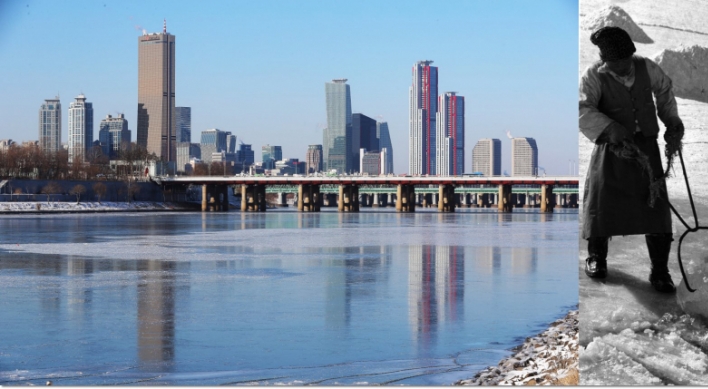
-
Cat 'butlers': Why more Koreans are cat-ering to feline friends
"Would you like to come and see my cat?" has become a trendy pickup line among young Koreans today, akin to "Want to Netflix and chill?" It also hints at cats' elevated status in South Korea. In the past, felines were shunned for their association with bad luck and superstitions, with many finding their infant-like cries and eyes particularly unsettling, but now cats enjoy a positive image in both the literal and figurative senses. Cats not only grace households with
Feb. 6, 2024

-
Reality check: How diverse is Korea really? LGBTQ+ in workplace (7)
In Korea, the issue of workplace diversity rarely extends to sexual minorities, but some companies -- mostly big exporters with world-class brands and local units of global firms -- have adopted corporate policies that prevent discrimination based on sexual or gender identity. The first company to do so was IBM Korea. In 2011, the Korean unit of the US firm announced a job posting that expressed a preference for hiring individuals from sexual minority groups. Major Korean firms, including Samsun
Feb. 5, 2024
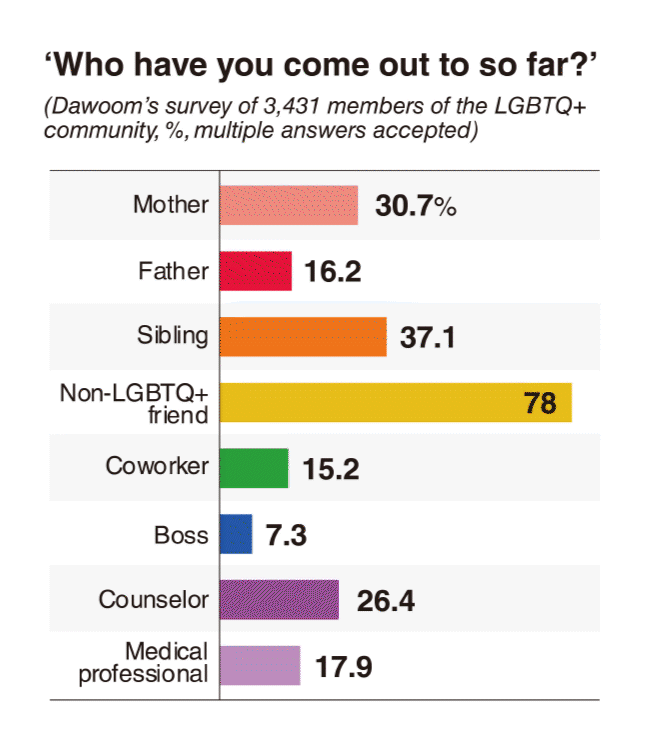
-
Reality check: How diverse is Korea really? Disability in workplace (6)
Around the world, people with disabilities are less likely to be employed than people without disabilities. In South Korea, the employment rate stands at 36.1 percent for people with disabilities, while the figure for those without a disability is 63 percent. The Korean government and public organizations are required by law to retain 3.4 percent of jobs for individuals with disabilities. In the private sector, companies with more than 50 employees are mandated to fill 3.1 percent of the payro
Feb. 4, 2024
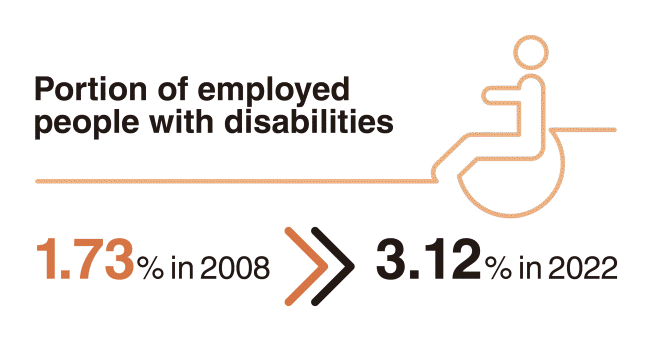
-
Reality check: How diverse is Korea really? Women in business (5)
Less than 60 percent of Korean women aged 15-64 work, some 18 percent less than their male counterparts. This, according to the OECD, is the seventh-largest gender disparity in labor force participation among its member nations. Female workers in Korea earned 31.1 percent less than their male counterparts on average as of last year. This gender pay gap is the highest in the club of 38 mostly developed countries and is about 20 percentage points higher than the OECD average of 12 percent. Turni
Feb. 1, 2024
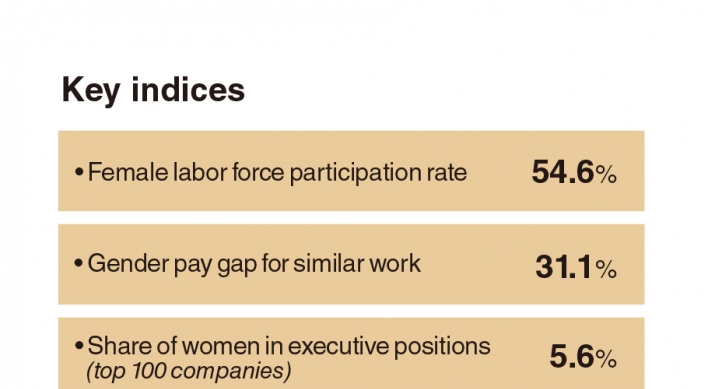
-
[LLG] A story of loving and letting go, repeated 19 times and counting
In 2011, Cho was 12 years old when the first baby arrived. He recalled sensing the presence of a new family member in the house when he came home from school one day -- the air smelled different, with the scents of milk and of an infant. Entering the house, he stumbled over baby products. Then, there, in the center of the living room lying on a blanket neatly spread out, was a small baby. “The baby was so tiny and I constantly checked to see if he was breathing,” said Cho Ddol-bok,
Jan. 31, 2024
![[LLG] A story of loving and letting go, repeated 19 times and counting](//res.heraldm.com/phpwas/restmb_idxmake.php?idx=652&simg=/content/image/2024/01/31/20240131000696_0.gif&u=)
-
[Korea Quiz] Dangerous for suicides
Find the answer at the bottom. With 25.2 deaths per 100,000 people in 2022, South Korea has the highest suicide rate among the mostly developed members of the Organization for Economic Cooperation and Development. To curb deaths by suicides, the country has employed a series of measures, which include the designation of certain items as “suicide hazardous materials.” These items are subject to tougher monitoring and management. The list, first created in 2020, initially included
Jan. 31, 2024
![[Korea Quiz] Dangerous for suicides](//res.heraldm.com/phpwas/restmb_idxmake.php?idx=652&simg=/content/image/2024/01/31/20240131000262_0.jpg&u=)
-
Dining out is going digital: Not everyone is happy
The days of flagging down busy servers are almost becoming rare here. At many Korean restaurants, diners are now being asked to order -- and often pay up front -- via a digital device installed at each table, or at standalone kiosks. Digitalization’s reach is not only limited to ordering systems, as at some venues, reserving and waiting for a table have been moved online. And there is a small but growing number of server robots being deployed. Using digital devices to order and pay purpo
Jan. 31, 2024
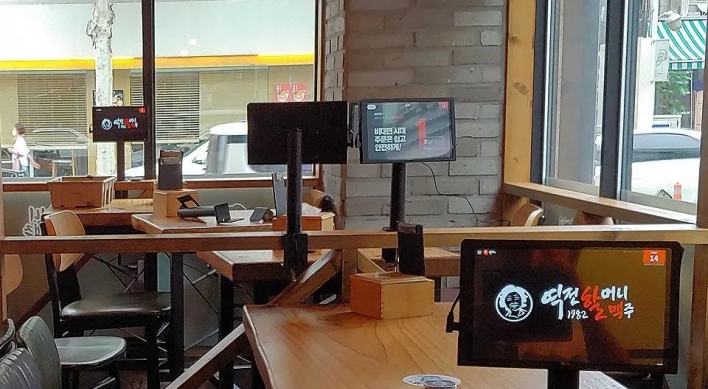
-
[AtoZ into Korean mind] Why Koreans feel compelled to stay busy -- or at least look like it
“You must have been very busy lately.” So starts many a conversation as a polite kind of South Korean icebreaker, often after having not met someone for quite a while. Responding to it by correcting its speaker with one's actual level of busyness is generally not advised. In practice, the ideal response would be, “You must be far busier than me,” redirecting the statement back to the speaker to compliment them on their relative societal importance, thereby boosting
Jan. 28, 2024
![[AtoZ into Korean mind] Why Koreans feel compelled to stay busy -- or at least look like it](//res.heraldm.com/phpwas/restmb_idxmake.php?idx=652&simg=/content/image/2024/01/28/20240128000153_0.jpg&u=)
-
Reality check: How diverse is Korea really? LGBTQ+ and politics (4)
South Korea defaults to heterosexuality as the predominant sexual identity publicly represented by political leaders. Among national politicians and elected parliamentarians, there have not been any public disclosures of a politician's sexual orientation throughout Korea’s entire legislative history. This lack of openly acknowledged LGBTQ+ representation in the country's top political leadership underscores the degree of exclusion and discrimination faced by LGBTQ+ individuals in
Jan. 25, 2024
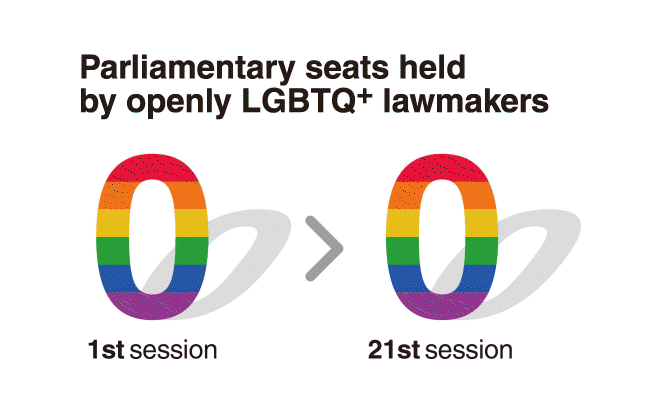
-
[Korea Quiz] Korea's spicy affair with noodles
Find the answer at the bottom. The roots of Korean ramyeon trace back to 1963 when Samyang Ramen, the first Korean ramyeon, made its debut. Featuring wheat noodles in a mild, chicken broth, the early product was not very popular, as noodles in general were not a popular meal option for Koreans at that time, due to the widespread preference for rice. But a shortage in rice production in the 1960s prompted the South Korean government to encourage wheat flour consumption, which gave a major boost
Jan. 25, 2024
![[Korea Quiz] Korea's spicy affair with noodles](//res.heraldm.com/phpwas/restmb_idxmake.php?idx=652&simg=/content/image/2024/01/25/20240125000215_0.jpg&u=)
-
Loved like idols, canceled like demons
The news that actor Lee Sun-kyun was being investigated for allegations of illegal drug use broke out on Oct. 19. Within days, Korean telecom giant SK Telecom pulled an advertisement featuring Lee and his wife. He was replaced by another actor in the drama series, "No Way Out," which was about to start shooting. The release of two of his films, which were in post-production at that time, became uncertain. In short, Lee was "canceled" less than a week after the allegations w
Jan. 24, 2024
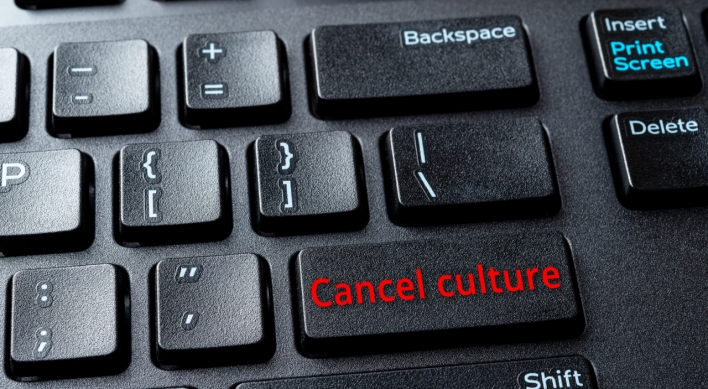
-
Reality check: How diverse is Korea really? Disabilities and politics (3)
As of 2022, individuals with disabilities make up 5.2 percent of South Korea's population. Using basic arithmetic, this percentage corresponds to approximately 15 seats in the country’s 300-member unicameral parliament. In reality, just four seats are currently occupied by individuals with disabilities, constituting only 1.3 percent. The first person with a disability to win a parliamentary seat as a constituency representative was Lee Chul-yong. In 1988, on the ticket of the libera
Jan. 24, 2024
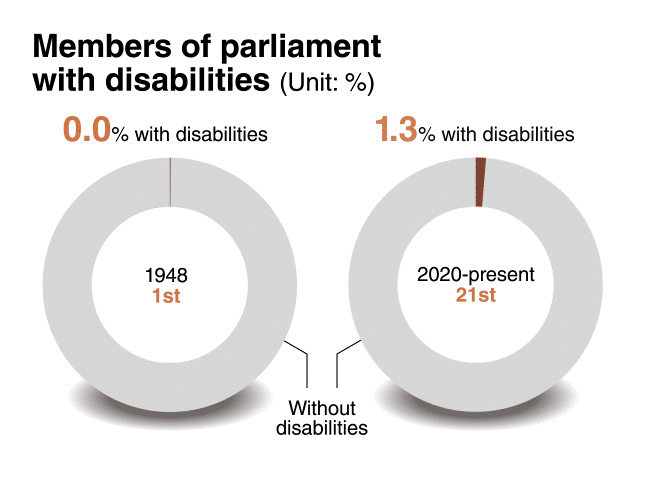
-
[Pressure points] Grilling meat on apartment balcony: right or public nuisance?
It might seem an ordinary domestic scene -- a picture of someone grilling pork belly on the enclosed balcony of their apartment -- but it touched off a storm of debate. The person who uploaded the photo said a neighbor living above them had taken exception to the smell and smoke coming from the barbecuing downstairs. Expressing bewilderment about how grilling in one’s own home could be deemed inappropriate, the anonymous poster posed the question: “Was this really a public nuisan
Jan. 23, 2024
![[Pressure points] Grilling meat on apartment balcony: right or public nuisance?](//res.heraldm.com/phpwas/restmb_idxmake.php?idx=652&simg=/content/image/2024/01/23/20240123000677_0.jpg&u=)
-
Reality check: How diverse is Korea really? Age and politics (2)
Across cultures and political systems, a common trait is that those in decision-making roles, particularly in politics and state governance, are often older than the average voter. This observation holds true in the context of South Korea’s unicameral parliament and central government, where the decision-making process is predominantly controlled by people in their 50s and 60s. Before delving into age representations in the parliament and government, here's a quick overview of Korea&#
Jan. 23, 2024
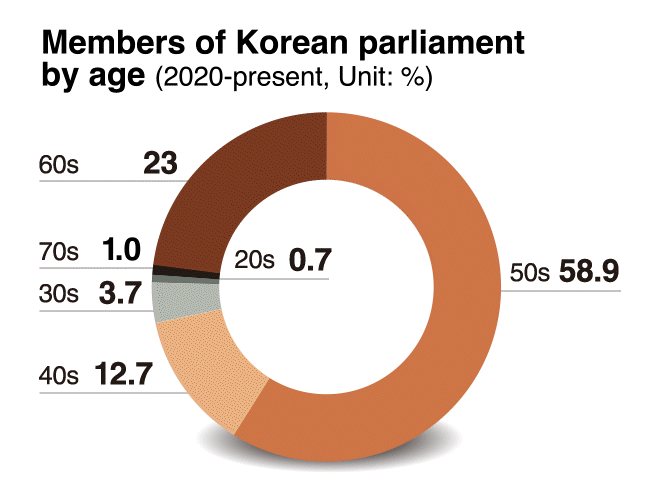





![[More than APT] Why apartment complexes flourish in Korea](http://res.heraldm.com/phpwas/restmb_idxmake.php?idx=644&simg=/content/image/2024/11/19/20241119050087_0.jpg&u=20241120105106)
![[Herald Interview] How Gopizza got big in India](http://res.heraldm.com/phpwas/restmb_idxmake.php?idx=644&simg=/content/image/2024/11/20/20241120050057_0.jpg&u=20241120164556)

![[KH Explains] Dissecting Hyundai Motor's lobbying in US](http://res.heraldm.com/phpwas/restmb_idxmake.php?idx=644&simg=/content/image/2024/11/20/20241120050034_0.jpg&u=)

![[Kim Seong-kon] Farewell to the vanishing John Wayne era](http://res.heraldm.com/phpwas/restmb_idxmake.php?idx=644&simg=/content/image/2024/11/19/20241119050096_0.jpg&u=)

![[Korea Quiz] Korean superstitions](http://res.heraldm.com/phpwas/restmb_idxmake.php?idx=652&simg=/content/image/2024/02/14/20240214050454_0.jpg&u=20240214143854)
![[AtoZ into Korean mind] ‘Chemyeon’: the role of 'face' in shaping Korea's cultural dynamics](http://res.heraldm.com/phpwas/restmb_idxmake.php?idx=652&simg=/content/image/2024/02/07/20240207050008_0.jpg&u=)
![[Pressure points] Lingering after meals during peak hours. Courtesy needed?](http://res.heraldm.com/phpwas/restmb_idxmake.php?idx=652&simg=/content/image/2024/02/07/20240207050010_0.jpg&u=20240211183629)
![[Korea Quiz] Seollal festivities](http://res.heraldm.com/phpwas/restmb_idxmake.php?idx=652&simg=/content/image/2024/02/07/20240207050020_0.jpg&u=20240213180834)
![[LLG] Meet the 'ramyeon conqueror' out to sample every instant noodle](http://res.heraldm.com/phpwas/restmb_idxmake.php?idx=652&simg=/content/image/2024/02/07/20240207050028_0.jpg&u=20240321140357)





![[LLG] A story of loving and letting go, repeated 19 times and counting](http://res.heraldm.com/phpwas/restmb_idxmake.php?idx=652&simg=/content/image/2024/01/31/20240131000696_0.gif&u=)
![[Korea Quiz] Dangerous for suicides](http://res.heraldm.com/phpwas/restmb_idxmake.php?idx=652&simg=/content/image/2024/01/31/20240131000262_0.jpg&u=)

![[AtoZ into Korean mind] Why Koreans feel compelled to stay busy -- or at least look like it](http://res.heraldm.com/phpwas/restmb_idxmake.php?idx=652&simg=/content/image/2024/01/28/20240128000153_0.jpg&u=)

![[Korea Quiz] Korea's spicy affair with noodles](http://res.heraldm.com/phpwas/restmb_idxmake.php?idx=652&simg=/content/image/2024/01/25/20240125000215_0.jpg&u=)


![[Pressure points] Grilling meat on apartment balcony: right or public nuisance?](http://res.heraldm.com/phpwas/restmb_idxmake.php?idx=652&simg=/content/image/2024/01/23/20240123000677_0.jpg&u=)
